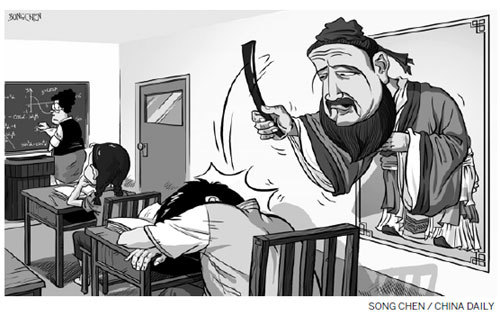Awaken sleeping princes and princesses
By Aaron A. Ves Sup (China Daily) Updated: 2014-10-18 08:42News of some students dozing off during a class lecture recently prompted some to say that the traditional system that pulls in the willing and unwilling into the academic field is to be blamed for that. But there is another perspective to this embarrassing show that I discovered when I started teaching in China 10 years ago.
Walking past several classrooms on a college campus in Hunan province I was struck by the litter, students' lack of attention and the number of "dozers" in classrooms. I started observing how teachers encountered such situations and discovered that they were simply plowing ahead with their lectures, head buried in their notes or backs turned to the class, never once attempting to engage the students in any type of interaction.

After almost three years, I moved to a university in Jilin province and found similar classroom profiles. In the front rows of the classes were students who were involved in the teacher-student experience. At the back, however, were the less involved: novel readers, cell phone addicts and various informal chit-chat groups who cared less about the goings on in class. Worried, I brought the issue to the notice of a few colleagues, who set me straight: "Some of the students are from influential families, nothing can be done"; "You are in China, if students give a teacher a negative evaluation this could cost him/her the job"; and "Of course, you can make demands on your students, you are a foreigner ... they will listen to you."
Moving to Beijing after four years - my confidence bolstered with two Chinese educational awards - I was surprised that the strange student-teacher symbiosis existed even in some classrooms in the capital. But here I was fighting the battle for attention even in my own class. Now, the shoe was on the other foot and I had to choose between grabbing the bull by the horns and letting things be as they were, and thus risk making a travesty of who I was and what was expected of me professionally.
Most teachers are either afraid or lacking in experience to teach and, hence, happy just to get through their lectures unscathed. Chinese students often seem to bear a strong sense of entitlement; they are the masters in the classroom. Also, some of them are quite immature, could have unique emotional challenges and need special attention but are lumped-in with others, or simply forced to "fit" into an archaic mold of traditional classrooms.
One female student again set me straight when I tried to know why she was refusing to participate in small group exercises. Her potential partner had complained: "She doesn't like me. She won't talk." When I checked with her further to know the reason for her attitude, she blurted out: "I'm tired. Leave me alone! I have too many things to deal with to be bothered with any of this today!" The entire class seemed to gasp in horror at this blatant show of disrespect. I calmly inquired why she had come to the class then. I was told that all students were locked out of their dormitories for a certain period and could not even go to the clinic or library, so sleeping in the class was their only option.
Although she apologized some days later, the problems she revealed were just the tip of the proverbial iceberg. Clearly, everyone is doing what he/she can do to survive. Survival for students may mean graduating from college. And survival for teachers could mean keeping students "happy" by being complacent about their behavior, while complaining to one another outside the classroom.
The poignant lesson one learns from all this is that, if I do not embrace my role as a teacher and if I do not care enough for each student who has enrolled in my class, regardless of his/her agenda, then how can I expect to draw his/her attention. If you don't love your job or if you are not confident about the subject you teach, and if you do not really care about outcomes, students will know. Students cannot be fooled. Teachers too must wake up, they must not let initial student attitudes throw them off track, they must be able to stay on course and be a "teacher". Often doing this involves more than simply being a vocal channel through which data flow. It takes years of conditioning to get it right, and to wake up.
The author is a cultural communication consultant.
(China Daily 10/18/2014 page5)
- Xi’an students become champions in debating tournament
- Wenjiang's students stand out in science knowledge competition
- Principal makes short work of students' long hair
- Students study 1 to 6 months for key test
- Brain study: Should students sleep or exercise?
- China bans 'improper relationships' between college teachers, students











